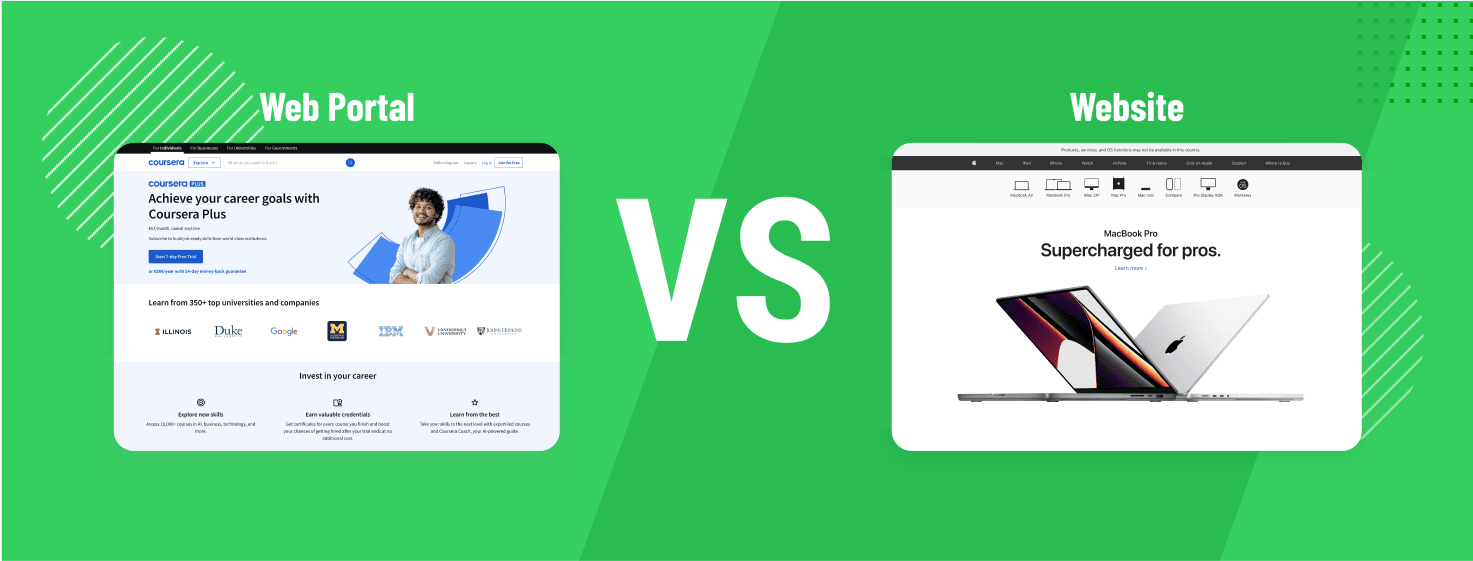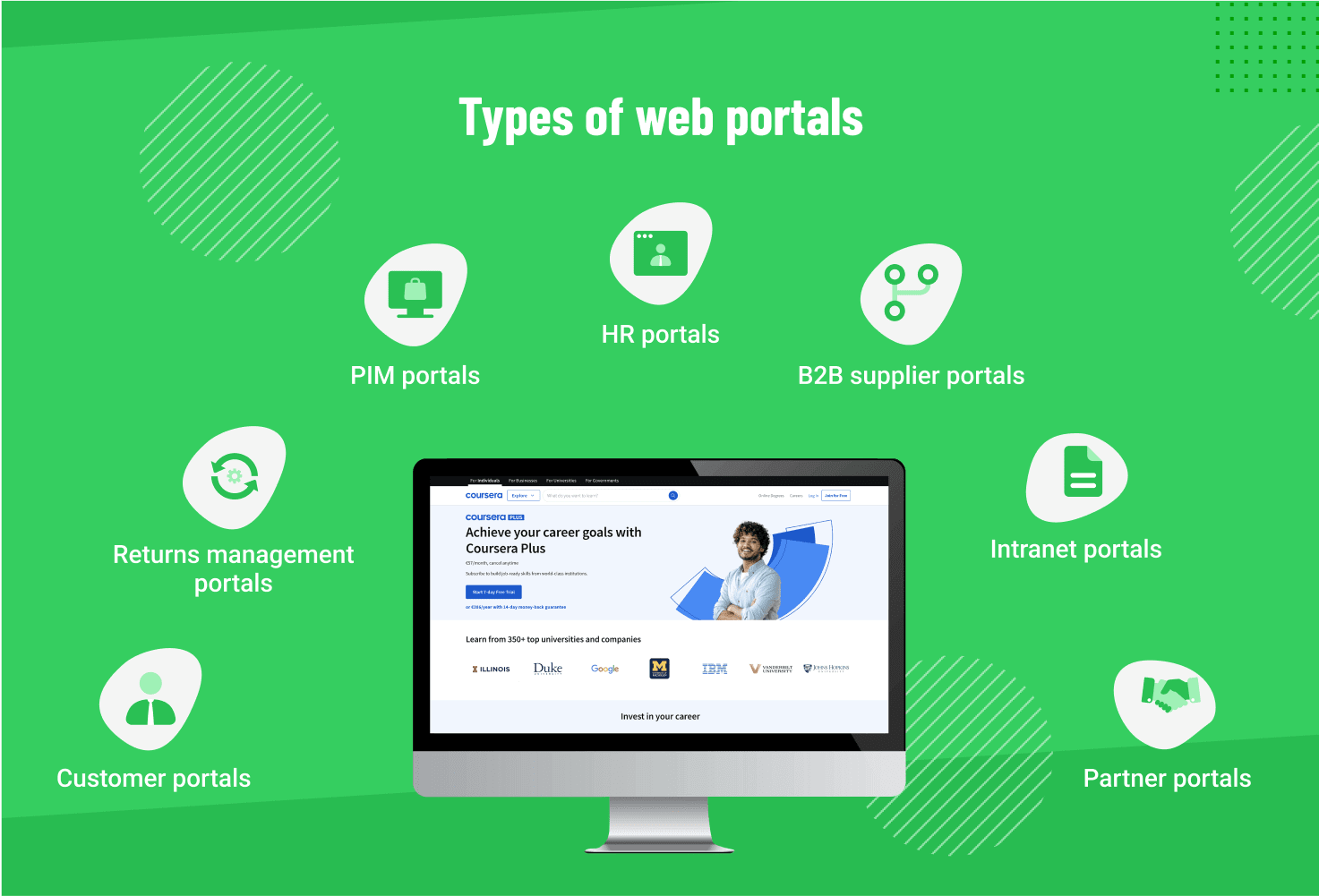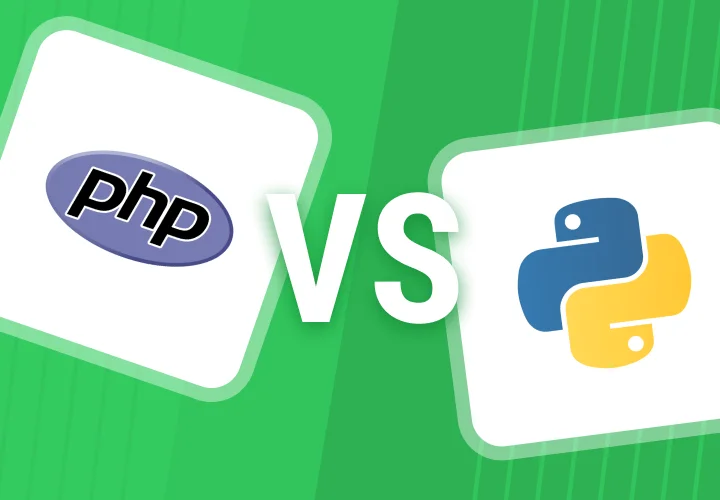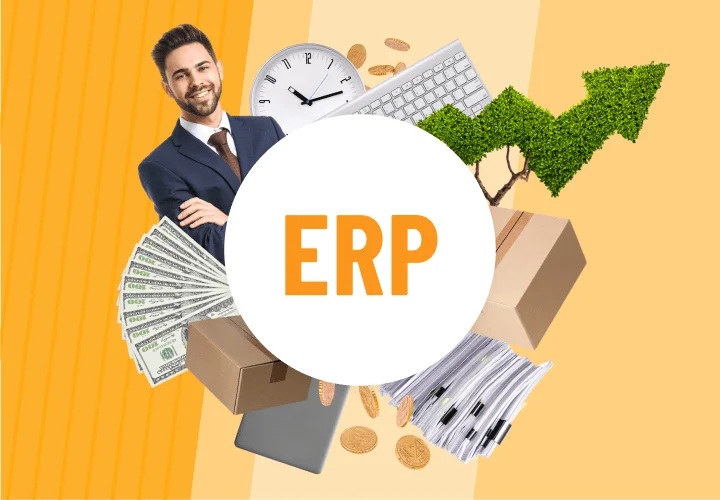Websites vs Web Portals: Understanding the Differences
Table of contents
- What Is a Website?
- Static websites
- Dynamic websites
- Interactive websites
- Single-page websites
- Progressive Web Apps (PWAs)
- Informational websites
- E-commerce websites
- Personal blogs
- Corporate websites
- Portfolio websites
- Community and forum websites
- Educational websites
- What Is a Web Portal?
- Vertical web portals
- Horizontal web portals
- Customer portals
- Returns management portals
- Product Information Management (PIM) portals
- HR portals
- B2B supplier portals
- Intranet portals
- Partner portals
- What Are Hybrid Websites?
- Amazon
- Salesforce
- Website vs Web Portal: Key Differences
- Portal vs. Website: What to Choose?
- Final Thoughts
Understanding the differences between a website and a portal is essential when building an online presence or optimizing business processes. While both serve as valuable digital tools, they cater to distinct needs and audiences.
This article delves into the definitions of websites and web portals, highlights their key differences, and offers guidance on which solution may best suit your business objectives.

What Is a Website?
Accotding to Techopedia, a website is a collection of interlinked web pages under a single domain name, accessible to the public via the Internet. These pages, maintained by individuals, businesses, or organizations, serve diverse purposes, such as sharing information, promoting services, or enabling online transactions. Often referred to as a "web presence" or simply a "site," a website is a foundational digital tool for connecting with audiences and achieving various objectives.
Websites can be classified based on their structure and functionality. Below are the most common types:
Static websites
Static websites are composed of fixed web pages with content that doesn't change unless manually updated by a developer. They are ideal for businesses or individuals seeking to showcase fixed information, such as portfolios or basic contact details.
Dynamic websites
Dynamic websites deliver content that changes based on user interaction or other variables, such as location or time. They are powered by databases and are commonly used by news platforms, blogs, and social networks to provide a personalized experience.
Interactive websites
Interactive websites encourage user participation by allowing users to complete forms, comment, or engage with quizzes or polls. Educational platforms, forums, and customer service portals widely employ these sites.
Single-page websites
Single-page websites condense all content into one scrollable page, providing a streamlined experience. They are often used for portfolios, event promotions, or product launches, where concise and visually engaging content is key.
Progressive Web Apps (PWAs)
PWAs combine website functionality with app-like features, offering offline capabilities, push notifications, and faster load times. These are popular among businesses looking to enhance mobile user experiences.
Websites can also be categorized based on the needs they cater to:
Informational websites
Informational websites are designed to share knowledge, such as articles, guides, or research. Examples include educational platforms, news outlets, and online encyclopedias.
E-commerce websites
E-commerce websites enable businesses to sell products or services online. These sites typically include features like shopping carts, payment gateways, and customer accounts to facilitate transactions.
Personal blogs
Individuals maintain personal blogs to share opinions, experiences, or expertise on a specific topic. They are ideal for building a personal brand or connecting with niche audiences.
Corporate websites
Corporate websites act as a company's digital face, providing information about services, the company’s mission, and contact details. They often include sections for investors, press releases, and careers.
Portfolio websites
Portfolio websites are tailored to showcase creative work, such as photography, design, or writing. They often emphasize visual appeal and serve as freelancers' or artists' "digital CVs."
Community and forum websites
Community websites focus on building online networks by facilitating discussions and sharing ideas. Examples include forums, niche communities, and support platforms.
Educational websites
Educational websites are designed to provide learning materials, courses, or training programs. They often include interactive features like quizzes or certifications to enhance the learning experience.
By understanding these classifications, businesses and individuals can decide how to develop a website that best aligns with their goals and audience's interests.
What Is a Web Portal?
Let's turn to Techopedia again. A web portal is a specially designed website that acts as a centralized hub, giving users a single access point to personalized and categorized information. Unlike standard websites, web portals integrate various tools and features, such as search navigation, task management, and collaboration, tailored to meet specific user needs. They serve as libraries of relevant content and offer functionalities like notifications, data analysis, business intelligence, and application integration, making them invaluable for businesses and organizations aiming to streamline operations and improve user experiences.
Web portals are often classified into two main categories based on their focus and functionality:
Vertical web portals
Vertical web portals focus on a specific industry, niche, or subject matter. They cater to a well-defined audience by aggregating specialized content and tools related to their interests. For example, a healthcare web portal might provide medical resources, appointment scheduling, and access to patient records for healthcare professionals and patients. Similarly, educational portals can centralize learning resources, course materials, and student progress tracking. These portals are essential for creating a tailored experience, boosting engagement, and enhancing efficiency in niche markets.
Horizontal web portals
On the other hand, horizontal web portals are broader in scope and serve a wide range of users across industries. They provide generalized services and tools, such as email, calendars, and news updates, while integrating access to multiple applications or systems. Examples include corporate intranet portals that centralize access to internal resources for employees or public-facing portals like Yahoo!, which offer a mix of news, entertainment, and search tools. Horizontal portals are invaluable for organizations that unite diverse services under one platform, ensuring seamless navigation and access.
Web portals come in various forms, catering to business needs and user groups. Below are some common examples illustrating the web portals' purposes and the value they bring:

Customer portals
Customer portals enable businesses to offer self-service options to their clients, reducing the dependency on customer support teams. These portals allow users to track orders, access support tickets, download invoices, or manage account settings. Customer portals enhance customer satisfaction and loyalty by improving user convenience and offering 24/7 access.
Returns management portals
Returns management portals streamline the process of handling product returns and refunds. Businesses use these portals to provide customers with clear instructions, tracking options, and automated updates regarding their return status. This functionality ensures a smooth and efficient returns experience, reducing customer frustration and operational costs.
Product Information Management (PIM) portals
PIM portals centralize the storage and distribution of product information across different sales channels. These portals help businesses maintain consistency, improve team collaboration, and ensure accurate customer data delivery. PIM portals are beneficial for E-commerce companies that manage extensive product catalogs.
HR portals
HR portals simplify employee management by providing centralized access to essential tools and resources. Employees can use these portals to submit leave requests, review payroll information, access training materials, and track performance metrics. HR portals improve organizational transparency, reduce manual HR tasks, and enhance employee engagement.
B2B supplier portals
B2B supplier portals foster smooth communication and collaboration between businesses and their suppliers. These portals provide tools for placing orders, tracking shipments, managing invoices, and reviewing contracts. By streamlining procurement processes, companies can ensure better relationships with suppliers and enhance operational efficiency.
Intranet portals
Intranet portals are internal-facing platforms that help employees access company resources, such as documents, announcements, and collaboration tools. These portals encourage teamwork, improve communication, and centralize workflows, making them vital for businesses of all sizes.
Partner portals
Partner portals are designed to strengthen relationships with external partners, such as distributors, resellers, or franchisees. These portals provide access to marketing materials, sales data, and collaboration tools, enabling seamless communication and support. Partner portals empower businesses to align goals with partners and drive mutual success.
By developing a web portal, businesses get versatile solutions tailored to specific operational or user requirements. Whether designed to improve customer satisfaction, boost team productivity, or streamline supply chain operations, these portals unlock immense value by delivering targeted functionality and unified access.
What Are Hybrid Websites?
Hybrid websites are unique online solutions that combine the functionality and features of websites and web portals. Like traditional websites, they are designed to provide general information to a broad audience while incorporating personalized and interactive features typically found in web portals. This hybrid approach makes them highly versatile and capable of serving multiple user groups and addressing a wide range of needs within a single platform.
Hybrid websites often integrate user accounts, dashboards, task management tools, and content personalization while maintaining a public-facing component to attract and inform new users. These solutions blur the lines between websites and portals, offering a tailored and cohesive experience for businesses looking to maximize their online presence.
The most famous examples of hybrid websites are:
Amazon
Amazon serves as an excellent example of a hybrid website. While it operates as an E-commerce website providing product catalogs and purchasing options, it also incorporates personalized user dashboards, recommendations, order tracking, and seller portals. This combination makes Amazon a hub for customers and third-party sellers, delivering an efficient and tailored experience for each user group.
LinkedIn blends the features of a traditional website with advanced portal-like functionality. Public pages provide information about the platform and professional tips, while personalized user accounts allow professionals to connect, network, and manage job applications. Employers also have access to recruitment dashboards, making LinkedIn a hybrid solution catering to multiple user types.
Salesforce
Salesforce combines the public-facing features of a website, such as product overviews and resource libraries, with an extensive portal-like backend that offers dashboards, analytics, and collaboration tools for customers. This hybrid approach allows Salesforce to cater to businesses of all sizes by providing both informational content and robust software-as-a-service (SaaS) solutions.
Who can benefit from hybrid web solutions? Hybrid websites are ideal for businesses that serve multiple user groups or combine public-facing content with interactive or personalized functionality. Organizations that can benefit from hybrid solutions include:
- E-commerce businesses: Companies looking to provide a seamless shopping experience while incorporating personalized recommendations, user accounts, and seller portals.
- Professional networks: Platforms like LinkedIn or Behance blend public networking tools with private user features.
- Educational institutions: Schools and universities seeking to create a website that provides general information and personalized portals for students, teachers, and caregivers.
- Healthcare providers: Clinics and hospitals offering a mix of public health information and patient portals for scheduling, telemedicine, and medical records.
- SaaS companies: Businesses like Salesforce that need to combine a marketing-oriented public website with feature-rich dashboards and tools for paying users.
- Event management firms: Companies hosting public-facing event pages while providing personalized ticketing dashboards, attendee management tools, and analytics.
By merging the best aspects of websites and web portals, hybrid websites provide businesses with an all-in-one solution, enabling them to meet diverse user needs while maintaining a cohesive digital presence. Hybrid solutions are a strategic choice for organizations looking to optimize their online platforms for engagement, personalization, and scalability.
Website vs Web Portal: Key Differences
While websites and web portals share similarities, their purpose, structure, and functionality set them apart. Websites are often designed for a broad audience and provide publicly accessible information, whereas web portals focus on delivering personalized content and features to specific users.
Below is a comprehensive comparison of the two solutions to help businesses understand which is better suited for their needs.
| Indicator | Website | Web Portal |
| Solution construction | A collection of interlinked pages accessible through a single domain. | A centralized platform designed to aggregate and deliver personalized content and tools. |
| Purpose & functionality | Primarily for sharing information, marketing, or E-commerce. | Focused on providing personalized, task-oriented tools for specific users or groups. |
| Approach to users | Targets a broad audience with public content for anyone who visits the site. | Offers individualized access, with content and tools tailored to the needs of registered users. |
| Content | General, informational, or promotional content. | Personalized and categorized content, often specific to user roles or tasks. |
| Access to content | Open and publicly accessible to all users. | Restricted; requires login credentials to access most content and features. |
| Type of content | Static or dynamic content, such as blogs, product pages, or contact forms. | User-specific content, such as dashboards, reports, and collaborative tools. |
| Interactivity & UX | Primarily focuses on navigation, search, and interaction with public-facing elements. | Provides interactive features like task management, notifications, and collaboration tools. |
| Admin panel | Typically used to manage general content and site structure. | Includes advanced administrative tools for managing user roles, permissions, and data. |
| Security & privacy | Basic security features like SSL certificates and user authentication for limited sections. | High-level security to ensure data protection and user privacy, including access control. |
| Maintenance & complexity |
Easier to maintain with fewer personalized components. | More complex to maintain due to user-specific features and role-based content management. |
Portal vs. Website: What to Choose?
When deciding between a website and a portal, the right choice depends on your business needs and the audience you aim to serve. Websites are perfect for businesses focused on public engagement and broad information sharing, while web portals shine in scenarios requiring personalized, role-specific access to data and tools.
To help you make an informed decision, we've outlined common business needs and the ideal solution in the table below.
| Business Need | Recommended Solution | Reason |
| Building an online presence and brand awareness | Website | A website provides broad visibility with public-facing content, helping you attract a wide audience. |
| Sharing information with a large, general audience | Website | Ideal for publishing news, blogs, or company updates accessible to anyone without restrictions. |
| Providing an online shopping experience (E-commerce) | Website | Websites are better suited for creating E-commerce stores with catalog displays and payment options. |
| Offering personalized tools for specific user roles | Web portal | Portals allow tailored access for individual users, such as customers, employees, or suppliers. |
| Facilitating internal company collaboration | Web portal | Web portals provide features like task management, role-based content, and communication tools. |
| Centralizing access to business-critical data | Web portal | Portals aggregate and categorize data for easy access, helping users complete specific tasks. |
| Ensuring secure and private access to sensitive content | Web portal | A portal’s advanced security measures protect user-specific information and provide role-based access control. |
| Managing customer relationships and services | Web portal | Customer portals enhance user engagement with self-service options and personalized account management. |
| Launching a personal blog or small-scale informational site | Website | Websites are simple, cost-effective solutions for sharing opinions or knowledge with the public. |
| Scaling digital solutions over time |
Depends on needs | Websites can be adapted with dynamic features; portals are ideal for role-based, personalized scaling. |
Final Thoughts
The decision between a website, a web portal, or even a hybrid solution is crucial for businesses aiming to establish or enhance their digital presence. Websites excel at delivering accessible, public-facing content, building brand awareness, and supporting E-commerce ventures. On the other hand, web portals offer personalized, secure, and role-specific functionality, making them indispensable for businesses that rely on tailored experiences, data centralization, and efficient collaboration.
As digital landscapes evolve, the choice isn't always black and white. Hybrid solutions are increasingly bridging the gap, combining the reach of websites with the functionality of portals to serve diverse and dynamic business needs.
Understanding your goals, audience, and operational requirements is key to selecting the right solution. Whether you're looking to share information broadly, provide personalized tools, or revolutionize your internal workflows, carefully aligning your business objectives with the right technology will ensure a strong foundation for future growth. Nevertheless, the best way to choose the right web solution is through consultation with specialists.
Updated on Feb 18, 2025





